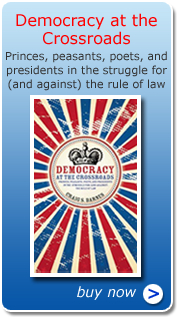The president’s campaign advertisements claim that he is a decisive leader. He is certainly that. He leapt into the saddle after 9/11 and rode furiously out of town. “Follow me!” He cried. “Over this hill; take that valley!” Who would not want—his advertisements seem to ask—a strong man, a man like the Lone Ranger, for president? Here is a leader willing to act on his own; no allies needed; he is capable of furious and relentless pursuit, through good times and bad; he will ride north, south, east or west.
But what if the man does not really know how to saddle a horse? What if the man does not know a platoon from a regiment? What if he never slept a night in the cold? What if he is strong and decisive charging relentlessly south when the outlaws went north? What if his record is that he himself evaded combat and now shoots like a nervous tenderfoot at every bush and tree?
Where I come from, when a man steps into the saddle and hasn’t tightened the cinch, it is time to start asking questions about whether he knows what he is doing.
Did the former pilot know what he was doing when, in 2002, he told the chairman of the joint chiefs of staff that we would not need additional ground troops to win a war in Iraq? Did the former owner of a Texas baseball team know what he was doing when he said that the Iraqis would welcome Americans in the streets?. Did the man who says that he does not like to read know what he was doing when he overrode weapons inspectors who had actually been on the ground and told them that he was sure that there was evidence—somewhere—of nuclear weapons? Did he know what he was doing when he cut taxes and drastically increased expenses? Did he know what he was doing when he went after Iraq and not Saudi Arabia?
Where I come from, when a man goes out tracking cattle or game, he follows the tracks where they lead, not where he wants them to lead, and if he does not know how to do that we call that incompetence.
A coach tells his team who will be on the other side of the ball, who they are and how strong they are and we don’t call that weakness; we call that competence. A CEO tells his management team about the competition, what they sell, how good it is and we don’t call that weakness; we call that competence. When, unlike these, a president makes up the facts, follows the wrong trail, saddles the wrong horse, we call that incompetence.
What was he thinking when he told the American people in February of 2003, a month before the invasion, that he had not made up his mind? Did he think all the world could not see that he had been preparing since the day after 9/11? What was the man thinking, in April, 2003, when he said victory was won? What is he thinking now, today, when he says that Americans will plant democracy in Iraq? Does he have any idea how mythical, how illusive, how arrogant, how incompetent that claim makes him appear?
Mr. Bush has led his countrymen into the valley of death; he has unleashed a horror upon the people of Iraq and Iraqis have quite naturally resisted that horror . The evidence is that the outlaws went north and more than a thousand American bodies and tens of thousands of Iraqi bodies lie all about the president ambushed at his feet. Still he, like the Lone Ranger says, “Keep on! Keep on, boys, ride south!”
I have a place in the mountains of Colorado and every so often in hunting season a party will come through from somewhere in the lowlands, often from Texas. Sometimes they swear and swagger and push up to the pack animals like they owned a horse’s soul. I have had it happen that they drove through my fences, like they owned the world. Sometimes they shoot at the stock like they did not know the difference between a horse and a deer. Mostly they are not bad people; they just don’t know what they are doing. You can see it in the arrogant way they walk. In Mr. Bush’s case—he’s one of those walkers—I would want to check that man’s cinch before I let him out of the corral. And I surely would not ever assume that he knew where he was going or what he was doing.
